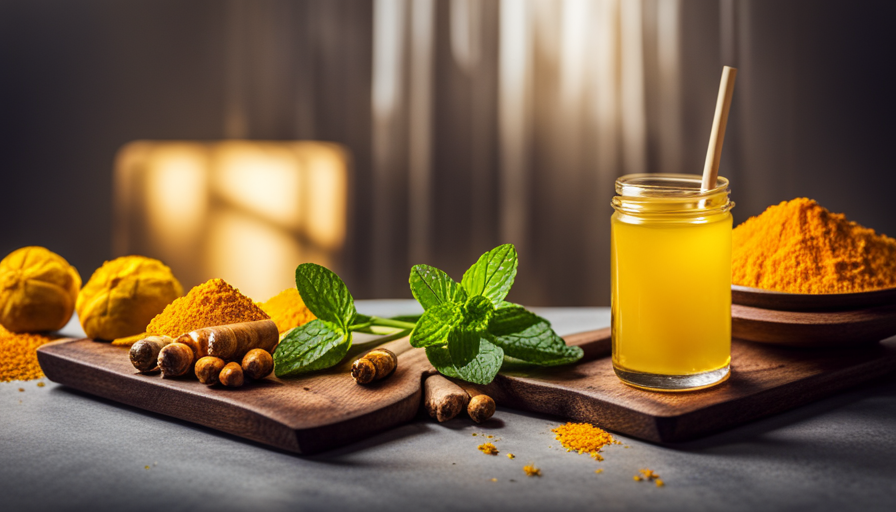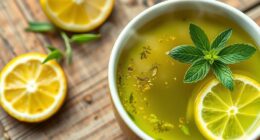As the saying goes, ‘A cup of turmeric tea a day keeps inflammation at bay!’ If you’re looking for a natural and effective way to reduce inflammation in your body, turmeric tea may just be the answer you’ve been searching for. This golden-hued beverage has been used for centuries in Ayurvedic medicine for its powerful anti-inflammatory properties.
But how much turmeric tea should you drink in a day to reap its benefits? In this article, we’ll explore the recommended daily intake of turmeric tea for inflammation and delve into how it works to reduce inflammation in the body. We’ll also provide practical tips on how to incorporate turmeric tea into your daily routine and discuss potential side effects and precautions to keep in mind.
So grab your favorite mug and let’s dive into the world of turmeric tea and its potential to soothe inflammation.
Key Takeaways
- The recommended daily intake of turmeric tea for inflammation is 1-2 cups per day.
- Excessive intake of turmeric tea may cause gastrointestinal discomfort or interact with certain medications, so it’s important to consult with a healthcare professional before significantly increasing intake.
- Turmeric tea reduces inflammation by suppressing the production of inflammatory molecules and neutralizing harmful free radicals, alleviating symptoms such as joint pain, swelling, and stiffness.
- Turmeric tea should be consumed consistently and in appropriate amounts to maximize its anti-inflammatory effects.
The Benefits of Turmeric Tea for Inflammation
Get ready to discover the amazing benefits of sipping on a delicious cup of turmeric tea to soothe inflammation! Turmeric tea has gained popularity for its potential role in managing chronic pain and reducing joint inflammation. This golden spice contains a compound called curcumin, which has been extensively studied for its anti-inflammatory properties.
Research suggests that curcumin can inhibit inflammatory molecules in the body, helping to alleviate pain and swelling. One study published in the Journal of Alternative and Complementary Medicine found that curcumin supplementation reduced pain and inflammation in patients with osteoarthritis. Another study in the Journal of Medicinal Food showed that curcumin can inhibit the activity of enzymes involved in joint inflammation, providing relief for individuals with rheumatoid arthritis.
While the benefits of turmeric tea for inflammation are promising, it is important to understand the recommended daily intake. As with any herbal remedy, moderation is key. It is generally recommended to consume no more than 1-2 cups of turmeric tea per day to experience its anti-inflammatory effects. Excessive intake may lead to gastrointestinal discomfort or interactions with certain medications.
So, let’s dive into understanding the recommended daily intake of turmeric tea and explore how to incorporate it into your daily routine.
Understanding the Recommended Daily Intake of Turmeric Tea
When it comes to incorporating this golden elixir into your routine, it’s important to understand the recommended daily intake of turmeric tea. Here are a few key points to keep in mind:
-
Recommended dosage: The recommended daily intake of turmeric tea varies depending on the individual and their specific health needs. However, a general guideline is to consume 1-2 cups of turmeric tea per day. This amount is considered safe and can provide potential benefits for reducing inflammation.
-
Potential risks: While turmeric tea is generally safe for consumption, it’s important to be mindful of potential risks. Turmeric contains a compound called curcumin, which can interact with certain medications and cause gastrointestinal issues in high doses. It’s advisable to consult with a healthcare professional before significantly increasing your intake of turmeric tea, especially if you have any underlying health conditions or are taking medications.
-
Other sources of turmeric: Keep in mind that turmeric can also be consumed in other forms, such as capsules or powders. These alternative sources may have different recommended dosages, so it’s important to follow the instructions provided by the manufacturer or consult with a healthcare professional.
Understanding the recommended daily intake of turmeric tea can help you incorporate it into your routine safely and effectively. Now let’s explore how turmeric tea reduces inflammation.
How Turmeric Tea Reduces Inflammation
To experience the anti-inflammatory benefits of turmeric tea, simply savor a warm cup of this golden elixir and watch as its soothing properties work their magic on your body. Turmeric tea is packed with compounds called curcuminoids, which have been shown to possess powerful anti-inflammatory properties. These curcuminoids target multiple pathways involved in inflammation, reducing the production of inflammatory molecules and inhibiting the activation of certain enzymes. As a result, turmeric tea can help alleviate symptoms of inflammation, such as joint pain, swelling, and stiffness.
To better understand how turmeric tea reduces inflammation, let’s take a closer look at its key benefits:
-
Anti-inflammatory effects: The curcuminoids in turmeric tea help to suppress the production of inflammatory molecules, reducing overall inflammation in the body.
-
Antioxidant properties: Turmeric contains potent antioxidants that neutralize harmful free radicals, which contribute to inflammation and oxidative stress.
Incorporating turmeric tea into your daily routine is an easy way to harness its anti-inflammatory benefits. By enjoying a cup of turmeric tea regularly, you can support your body’s natural defenses against inflammation and promote overall well-being. Transitioning into the next section, let’s explore how to incorporate turmeric tea into your daily routine.
Incorporating Turmeric Tea into Your Daily Routine
When it comes to incorporating turmeric tea into my daily routine, I’ve found a few different ways to prepare it. One option is to steep a teaspoon of ground turmeric in hot water and add a squeeze of lemon for flavor.
Another method I enjoy is adding a teaspoon of turmeric paste to my morning smoothie. To maximize the anti-inflammatory effects of turmeric tea, I make sure to combine it with a source of fat, such as coconut milk or a teaspoon of coconut oil, as it helps with absorption.
Different ways to prepare turmeric tea
If you’re looking for a quick and easy way to incorporate turmeric into your daily routine, try making a delicious cup of turmeric tea. There are various ways to prepare this beneficial beverage, allowing you to choose the method that suits your taste preferences.
One popular variation is to brew a simple turmeric tea by steeping ground turmeric in hot water for about 10 minutes. You can also add other ingredients like ginger, black pepper, or honey to enhance the flavor and maximize the health benefits.
The anti-inflammatory properties of turmeric are well-known, and consuming turmeric tea regularly can help reduce inflammation in the body. To maximize its anti-inflammatory effects, it’s important to consume turmeric tea consistently and in appropriate amounts.
Now, let’s move on to some tips for maximizing its anti-inflammatory effects.
Tips for maximizing its anti-inflammatory effects
For the best results in reducing inflammation, make sure you savor every sip of your turmeric tea. Turmeric contains a compound called curcumin, which has powerful anti-inflammatory properties. To maximize turmeric’s benefits, it’s important to consume it in the right way. One key factor is timing – the best time to drink turmeric tea is in the morning or before a meal, as this allows your body to absorb the curcumin more effectively. Additionally, adding a pinch of black pepper to your tea can enhance curcumin’s absorption. Another tip is to pair turmeric tea with a source of healthy fat, such as coconut oil or almond milk, as curcumin is fat-soluble. By following these tips, you can ensure that you are getting the most out of your turmeric tea in terms of its anti-inflammatory effects. As with any supplement or herbal remedy, it’s important to be aware of potential side effects and precautions.
Potential Side Effects and Precautions
Be aware of the potential side effects and precautions of turmeric tea, as it’s always better to be cautious before sipping this golden elixir. While turmeric tea is generally safe for most people when consumed in moderate amounts, excessive intake may lead to certain side effects. Here are four important things to keep in mind:
-
Digestive Issues: Turmeric tea, when consumed in large quantities, can cause stomach upset, bloating, and diarrhea. It’s advisable to start with small doses and gradually increase to assess your tolerance.
-
Blood Thinning: Turmeric contains a compound called curcumin, which has anticoagulant properties. If you’re already taking blood-thinning medications, excessive consumption of turmeric tea may increase the risk of bleeding.
-
Gallbladder Issues: Turmeric can stimulate the production of bile, which may be problematic for individuals with gallbladder issues. It’s recommended to consult with a healthcare professional if you have gallstones or any gallbladder problems.
-
Allergic Reactions: Some individuals may be allergic to turmeric and may experience symptoms such as skin rashes, itching, or difficulty breathing. If you’re allergic to turmeric or any other members of the ginger family, it’s best to avoid turmeric tea.
Considering these precautions, it’s important to consume turmeric tea in moderation and consult with a healthcare professional if you have any concerns. Now, let’s explore other natural remedies for inflammation.
Other Natural Remedies for Inflammation
Let’s explore some other natural remedies that can help soothe inflammation and promote overall wellness. In addition to turmeric tea, there are several alternative treatments that’ve shown promise in reducing inflammation.
One such remedy is ginger, which contains gingerol, a compound with potent anti-inflammatory properties. Adding fresh ginger to your meals or drinking ginger tea can be beneficial.
Another natural remedy is green tea, which is rich in antioxidants that may help reduce inflammation. Consuming a few cups of green tea daily can be a great addition to your anti-inflammatory regimen.
Omega-3 fatty acids found in fatty fish like salmon, mackerel, and sardines’ve also been shown to have anti-inflammatory effects. Incorporating these fish into your diet a few times a week can provide a good dose of omega-3s.
Additionally, certain herbs and spices like cinnamon, cloves, and rosemary’ve been found to possess anti-inflammatory properties. Including these ingredients in your cooking can not only add flavor but also contribute to reducing inflammation.
While these natural remedies can be beneficial, it’s important to consult with a healthcare professional before incorporating them into your daily routine, especially if you have any underlying medical conditions or are taking medications.
With that in mind, let’s now consider the conclusion: is turmeric tea right for you?
Conclusion: Is Turmeric Tea Right for You?
Consider whether turmeric tea is a suitable addition to your anti-inflammatory routine by exploring its potential benefits and consulting with a healthcare professional. Turmeric tea has gained popularity for its potential health benefits, including its anti-inflammatory properties. However, it’s important to note that while turmeric tea may have some benefits, it isn’t a cure-all for inflammation.
When it comes to weight loss, turmeric tea may play a role. Research suggests that curcumin, the active compound in turmeric, may help in weight management by reducing inflammation and oxidative stress in the body. Additionally, turmeric tea can aid in improving gut health. It has been found to have antioxidant and anti-inflammatory effects on the gut, which can promote a healthy digestive system and alleviate symptoms of gastrointestinal disorders.
While turmeric tea is generally considered safe, it’s important to consume it in moderation and be aware of any potential side effects. Some people may experience stomach upset or allergic reactions when consuming turmeric tea. It’s also important to note that turmeric tea may interact with certain medications, so it’s crucial to consult with a healthcare professional before incorporating it into your routine.
Turmeric tea may have some potential benefits for weight loss and gut health. However, it’s essential to consult with a healthcare professional to determine if it’s suitable for you and to ensure it doesn’t interfere with any medications you may be taking.
Frequently Asked Questions
Can turmeric tea be consumed on an empty stomach?
Yes, turmeric tea can be consumed on an empty stomach. It has numerous benefits, including reducing inflammation. The best time to drink it is in the morning, as it can help kickstart your digestion and boost your immune system.
Is it safe to drink turmeric tea during pregnancy?
During pregnancy, it is generally safe to drink turmeric tea in moderate amounts. However, it’s important to consult with a healthcare provider for individualized advice. Turmeric tea may have potential benefits for postpartum recovery and breast milk production.
Can turmeric tea interact with certain medications?
Turmeric tea can interact with certain medications due to its active compound, curcumin. It may enhance the effects of blood thinners and increase the risk of bleeding. Consult your doctor before consuming turmeric tea to ensure it is safe for you.
How long does it take for turmeric tea to start reducing inflammation?
Turmeric tea typically starts reducing inflammation within a few weeks of regular consumption. It is generally safe to drink, but some people may experience mild side effects like upset stomach or diarrhea.
Can turmeric tea be consumed by children?
Turmeric tea is a healthy beverage with numerous benefits for children. It can be consumed in moderation to support their overall health and well-being. However, it’s important to consult a healthcare professional for the appropriate dosage.
Conclusion
So, after diving into the world of turmeric tea and its potential benefits for inflammation, I’m not convinced. I’m not convinced because while many people swear by this golden elixir, claiming it’s a miracle cure, the truth is, the evidence is still lacking. The evidence is still lacking because sure, there are some studies that suggest turmeric may have anti-inflammatory properties, but the jury is still out. The jury is still out, so while a cup of turmeric tea may taste delicious, don’t expect it to be a cure-all for inflammation. Don’t expect it to be a cure-all for inflammation because as always, it’s important to consult with a healthcare professional before making any drastic changes to your diet or lifestyle.










